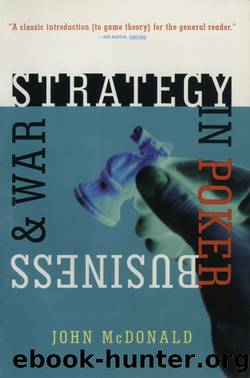Strategy in Poker, Business & War by John McDonald

Author:John McDonald
Language: eng
Format: epub
Publisher: W. W. Norton & Company
* Norbert Wiener, mathematician, of Cybernetics fame (the theory of “control and communication in the animal and the machine,” which is associated with the development of high-speed calculating machines), has something to say on the subject of chess: “It is the question whether it is possible to construct a chess-playing machine, and whether this sort of ability represents an essential difference between the potentialities of the machine and the mind. Note that we need not raise the question as to whether it is possible to construct a machine which will play an optimum [rational] game in the sense of von Neumann. Not even the best human brain approximates to this. At the other end, it is unquestionably possible to construct a machine that will play chess in the sense of following the rules of the game, irrespective of the merit of the play. This is essentially no more than the construction of a system of interlocking signals for a railway signal tower. The real problem is intermediate: to construct a machine which shall offer interesting opposition to a player at some one of the many levels at which human chess players find themselves. I think it is possible to construct a relatively crude, but not altogether trivial, apparatus for this purpose. The machine must actually play—at high speed if possible—all its own admissible moves and all the opponent’s admissible ripostes for two or three moves ahead.”
† In spite of the “pessimism” in this theory, the player following it can nevertheless secure a result (an expectation value or a statistical mean result) which is no less than that to which the opponent (by similar action) can forcibly limit him. This “value” which both players can unilaterally enforce (one as a minimum, the other as a maximum) is the “value of the game”—if played “correctly.” The existence of such a “value” is the decisive mathematical result.
‡ The poker player who wishes to speculate intuitively might consider the following rule for taking action against a player who is bluffing contrary to good strategy: “if the opponent ‘Bluffs’ too much for a [given] hand . . . then he can be punished by the following deviations from the good strategy: ‘Bluffing’ less for hands weaker than [the given hand], and ‘Bluffing’ more for hands stronger than [the given hand].” The reverse also holds. Thus the defensive counterattack is to imitate your opponent’s mistake for stronger hands and to take contrary action for weaker hands.
Download
This site does not store any files on its server. We only index and link to content provided by other sites. Please contact the content providers to delete copyright contents if any and email us, we'll remove relevant links or contents immediately.
The Bullet Journal Method by Ryder Carroll(1553)
Doesn't Hurt to Ask by Trey Gowdy(1404)
The Concise Laws of Human Nature by Robert Greene(1240)
The 7 Habits of Highly Effective People by Stephen R. Covey & Sean Covey(1021)
HBR's 10 Must Reads 2021 by unknow(977)
Hook Point: How to Stand Out in a 3-Second World by Brendan Kane(941)
HBR's 10 Must Reads 2021 by Harvard Business Review(880)
The Job Closer by Steve Dalton(841)
Don't Sweat the Small Stuff...and It's All Small Stuff by Richard Carlson(817)
Master of One by Jordan Raynor(813)
100 Things Successful People Do by Nigel Cumberland(808)
Primal Leadership by Daniel Goleman(802)
Amazon Unbound by Brad Stone(781)
Declutter Your Mind: A step by step guide to learn to control your thoughts, stop worrying, relieve anxiety and eliminate panic attacks and negative thinking by Mia Chandler(754)
Lives of the Stoics by Ryan Holiday & Stephen Hanselman(729)
Coders at Work: Reflections on the craft of programming by Peter Seibel(663)
The Power of 100! by Shaun King(649)
Conflicted by Ian Leslie(649)
The Mechanism of Mind by Edward De Bono(639)
